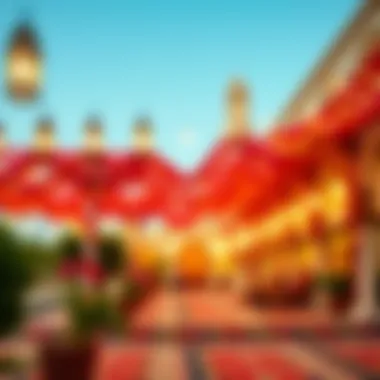Exploring Public Holidays in the UAE: Significance and Impact


Intro
Public holidays in the UAE serve not just as days of relaxation but also as a unique reflection of the nation’s rich tapestry of cultural, religious, and civic life. These observances are woven deeply into the societal fabric, giving insight into how history and tradition shape contemporary life in this vibrant region. Understanding these holidays can significantly enhance the comprehension of local customs, economic activities, and even opportunities in real estate.
Holidays in the UAE are determined based on both the Gregorian and Islamic calendars, which can create a rather dynamic landscape of dates that vary from year to year. Moreover, each emirate might have its own distinct celebration or variation in the observance of these holidays, which can influence various sectors including retail, tourism, and, importantly, real estate.
In this article, we will embark on a detailed exploration of public holidays within the UAE, diving into their significance and the cultural context that shapes these observances. We aim to provide investors, buyers, agents, and expatriates with a nuanced understanding of how these holidays affect civic life, economic activities, and property investment opportunities, particularly in areas like Dubai.
As we navigate through the calendar of holidays, we'll shed light on the market insights and investment strategies that align with these special days. By the end of this article, you should have a comprehensive grasp of the public holiday landscape in the UAE and how it weaves into the broader economic picture.
Intro to Public Holidays in UAE
Public holidays in the United Arab Emirates serve as essential markers in the cultural and social fabric of this vibrant nation. These observances are not merely days off from work; they represent a confluence of tradition, community, and celebration that resonates deeply with the people. For investors, buyers, agents, and developers looking to navigate the UAE landscape, understanding public holidays is crucial for various reasons.
Firstly, public holidays dictate the rhythm of life in the Emirates. Travel plans, business operations, and community activities often revolve around these specific dates. For instance, knowing when Eid al-Fitr or UAE National Day occurs can aid in planning real estate strategies or marketing campaigns. Understanding when citizens and expatriates take time off can allow businesses to operate optimally, avoiding potential downtime or disruptions.
Moreover, the significance of each holiday extends beyond mere enjoyment. Many public holidays reflect the UAE's diverse cultural history and religious practices. For example, Eid al-Adha not only exemplifies Islamic values of sacrifice and charity but also provides opportunities for communal gatherings and philanthropic actions. Recognizing these subtleties can give investors a competitive edge, enabling them to connect more authentically with their clientele.
In addition, awareness of public holidays impacts property demand. For instance, during holiday seasons, there can be an influx of tourists, which can affect rental prices and availability. Buyers and investors need to know these patterns to make informed decisions in real estate. An understanding of how these celebratory times affect market trends is invaluable for anyone in the property sector.
Furthermore, this knowledge fosters deeper engagement with local customs, enhancing relationships with stakeholders. It can promote a sense of belonging and respect for cultural nuances that is highly regarded in the UAE. By immersing oneself in the significance of public holidays, engaging with communities becomes more meaningful and impactful.
In summary, when it comes to grasping the dynamics of public holidays in the UAE, it's not just about date markers on a calendar. It's about comprehending their societal implications, recognizing commercial opportunities, and appreciating the unique blend of culture and tradition that defines these observances. As we delve into the historical context, types, and impact of public holidays in succeeding sections, one can see their overarching importance in shaping civic life, economic activities, and ultimately, real estate dynamics in this fascinating region.
Historical Context of Public Holidays
Public holidays in the UAE hold a significant place not just on the calendar but also in the collective consciousness of its people. They serve as a reflection of the country's rich history intertwined with its evolving social fabric. Understanding this historical context is paramount, as it provides a backdrop against which these celebrations are understood, marking pivotal moments in the nation’s and the region's transformation.
Cultural Roots
The cultural roots of public holidays in the UAE are steeped in both Islamic traditions and the region's pre-Islamic heritage. Prior to the establishment of the UAE as a unified nation in 1971, the seven emirates had their own unique customs and celebrations that often revolved around seasonal changes, agricultural cycles, and significant events.
For instance, the traditional harvest festival celebrated in various emirates, called the Kharif, is an echo of ancient practices where communities came together to rejoice in the bounty of the land. In essence, these festivals laid down the groundwork for the communal spirit seen during modern public holidays.
Additionally, Islamic holidays, such as Eid al-Fitr and Eid al-Adha, find their significance rooted in religious observances which date back to the time of the Prophet Muhammad. These holidays represent not just a time for celebration but also for reflection, prayer, and community bonding, reinforcing social ties that continue to resonate today. As such, the cultural roots of public holidays can be seen as a tapestry woven from the past, encompassing indigenous customs and Islamic traditions alike.
Evolution Over Time
The evolution of public holidays in the UAE showcases the dynamic interplay of tradition and modernity. Following the establishment of the UAE, a need arose to create a unified sense of identity, thus prompting the government to formalize certain holidays that celebrate national unity and pride. UAE National Day, for example, is celebrated on December 2nd, marking the day in 1971 when the emirates united. This holiday not only celebrates the founding of the nation but also illustrates how far the UAE has come since that initial unification.
Over the years, other holidays adapted to reflect global influences and changing cultural landscapes. For instance, New Year's Day is not rooted in traditional Emirati customs, yet it has become widely recognized and celebrated across the nation, highlighting the country's modern global connections.
Looking through the historical lens, one can observe how each holiday has adapted and morphed to reflect societal changes, economic growth, and shifts in the fabric of cultural identity.
"A nation's holidays serve as mirrors reflecting the values, traditions, and aspirations of its people."
Types of Public Holidays
Public holidays in the United Arab Emirates play a critical role not only in cultural celebrations but also in shaping the social and economic landscape of the country. Understanding the different categories of holidays provides insights into their significance and impact on everyday life, particularly for investors, buyers, agents, developers, and expatriates. It is essential to note that these holidays are broadly classified into three types: national holidays, religious holidays, and civic holidays.
National Holidays
National holidays in the UAE are deeply intertwined with the identity and unity of the nation. These days commemorating pivotal events in the country’s history serve to cultivate national pride and promote social cohesion among Emiratis and expatriates alike. The key national holiday is UAE National Day, celebrated on December 2nd. This date marks the unification of the seven emirates in 1971. People celebrate with widespread festivities, including fireworks, parades, and cultural showcases.
- New Year's Day, celebrated on January 1st, serves as another notable occasion for marking new beginnings.
- It's common for businesses to have special discounts and promotions during this time, attracting both locals and tourists.
During these holidays, many businesses close, and public services halt operations. This duration highlights how national holidays foster a much-needed respite for individuals to reconnect with family and community. The effect on retail and hospitality sectors is palpable, providing investors a window to capitalize on increased consumer spending during festive periods.
Religious Holidays
Religious holidays in the UAE, particularly those observed by the Muslim community, hold immense spiritual significance. These observances stem from Islamic traditions and customs, with the most recognized being Eid al-Fitr and Eid al-Adha. Each year, these holidays are celebrated with communal prayers, feasting, and charitable acts, mirroring deep-rooted values in the culture.
- Eid al-Fitr, marking the end of Ramadan, varies annually based on the lunar calendar. This celebration includes giving Zakat al-Fitr, a form of almsgiving meant to purify those who fasted during Ramadan.
- Eid al-Adha commemorates the willingness of Ibrahim to sacrifice his son in obedience to God. It serves as a reminder of faith and unity, celebrated with prayers, family gatherings, and the ritual sacrifice of animals, often shared among those less fortunate.
It's notable that during these holidays, the general atmosphere promotes extensive community interactions and engagement, creating an uplifted social fabric. The tourism impact is substantial as hotels and attractions curate special events, catering not only to local audiences but also to international visitors looking to experience authentic Emirati culture.
Civic Holidays
Civic holidays in the UAE underline the importance of social development and recognizing contributions to society. One such day is Martyrs’ Day, observed on November 30th. This holiday honors those who sacrificed their lives for the UAE’s progress.
- It is a time for reflection, marking events in which citizens and residents unite in showing respect and gratitude toward those who have dedicated their lives in service.
Moreover, observe the Islamic New Year, which marks the beginning of the Islamic lunar calendar. Although not widely celebrated with festivities like Eid, it is a time for spiritual reflection and planning for the year ahead.
Civic holidays encourage a profound sense of responsibility and community involvement, reminding both Emiratis and expatriates of their roles in supporting the nation’s values and heritage. Many organizations take this opportunity to engage in community service, linking civic duty with a broader ethos of social responsibility.
In summary, the types of public holidays in the UAE encompass a wide range of significances, from national pride reflected in National Days to the solemnity of civic observances. Each holiday type contributes uniquely to the cultural mosaic, offering valuable insights into the society’s values and dynamics that undoubtedly resonate in economic activities across sectors.
List of Major Public Holidays
In the UAE, public holidays serve as more than just days off work; they weave together the fabric of cultural identity and community spirit. Understanding this list is crucial for anyone engaged with the region—be it investors, expatriates, or locals—who want to acknowledge, respect, and even leverage these holidays in their business and interpersonal relationships.
These observances not only allow individuals to partake in festivities but also have significant implications for commercial activities, real estate dynamics, and community engagement. Knowing when these holidays fall can greatly assist in planning investments, marketing campaigns, and even personal commitments.
New Year's Day
Celebrated on January 1, New Year’s Day in the UAE marks the beginning of the Gregorian calendar. It’s a day devoid of long-standing cultural rituals but often embraced with lavish parties and fireworks, particularly in cities like Dubai and Abu Dhabi. Many businesses seize the opportunity for promotional campaigns, aiming to attract both locals and tourists coming for festivities.
Eid al-Fitr


Eid al-Fitr, the festival that concludes Ramadan, holds immense spiritual significance for Muslims. The date is determined by the lunar calendar, which leads to variability each year. This holiday encourages generosity, and many engage in acts of charity during this time. Special attention is paid to family gatherings and communal prayers, reflecting the social fabric of the region. For businesses, Eid provides a unique chance to connect with customers on a more personal level, often increasing consumer spending dramatically.
Eid al-Adha
Eid al-Adha commemorates the willingness of Ibrahim to sacrifice his son as an act of obedience to God. It is marked by the ritual of sacrifice and has a profound cultural resonance. Families come together not just for feasting but for community prayers. From a business standpoint, understanding the timing of this holiday is vital, as many companies adjust schedules accordingly to accommodate their employees’ needs.
UAE National Day
Celebrated on December 2nd, UAE National Day is an explosion of patriotism and unity. This day commemorates the founding of the UAE in 1971. Festivities include parades, cultural events, and fireworks. Real estate dynamics often shift during this time, with promotional offers designed to attract buyers and renters capitalizing on the celebratory atmosphere. For foreign investors, recognizing how business is impacted can guide better strategic decisions.
Islamic New Year
While the Islamic New Year does not usually involve significant public festivities, it’s a day for reflection and spiritual growth. Celebrated on the first day of Muharram, it can present opportunities for businesses, particularly in the wellness and self-improvement sectors. Understanding its significance helps brands resonate better with potential clients looking for mindful experiences during this time.
Martyrs' Day
Martyrs’ Day is a solemn occasion observed on November 30th to honor Emiratis who have sacrificed their lives for their country. It is marked with memorial services and reflects on the valor demonstrated by those who served. For investors and real estate professionals, this day prompts a unique opportunity to engage authentically with the local populace, demonstrating respect and understanding, which can foster positive business relationships.
Understanding these holidays not only allows individuals to work within the cultural framework of the UAE but also deepens connections with the community, facilitating smoother transactions and stronger relationships in both personal and professional spheres.
Determining Dates for Islamic Holidays
Understanding how dates for Islamic holidays are established is crucial when discussing public holidays in the UAE. These dates significantly influence not just cultural but also economic activities. In a nation where traditions intermingle with global commerce, grasping the nuances of how these dates are determined can offer valuable insights into the rhythm of Emirati life.
Lunar Calendar Influence
Islamic holidays rely heavily on the lunar calendar, which contains 354 days, contrasting with the solar calendar used in many Western countries. This difference in structure means that Islamic holidays occur about 10 to 12 days earlier each year. For instance, Eid al-Fitr and Eid al-Adha are celebrated on the first days of Shawwal and Dhu al-Hijjah, respectively, but since the lunar year is shorter, these holidays shift annually on the Gregorian calendar. This shifting nature imbues each year with a unique character, as celebrations may span different seasons, affecting everything from planning trips to how businesses schedule promotions.
The influence of the lunar calendar also shapes societal rhythms. Families might prepare festive meals differently depending on the season, be it hot summer days or cooler fall evenings. As a result, both residents and expatriates in the UAE should keep an eye on lunar sightings and announcements to align their festivities accordingly.
Moon Sighting Traditions
Another vital aspect of determining Islamic holiday dates involves the practice of moon sighting. Traditionally, local religious authorities or community members look for the crescent moon that indicates the start of a new month in the Islamic calendar. This is not only a religious practice but also a communal event that helps strengthen ties within neighborhoods.
Once the moon is sighted, official announcements follow, letting the public know when the holiday will commence. Oftentimes, these announcements spark an avalanche of excitement and preparation, as families finalize their holiday plans with vigor. However, this process can lead to some variability in dates, as different regions might sight the moon individually. For example, the start of Ramadan may differ by a day in neighboring emirates, leading to contrasting observance patterns.
The moon sighting not only marks the changing calendar but also serves as a spiritual reminder for many, bringing communities together in collective participation.
In summary, understanding the intricacies surrounding the lunar calendar and moon sighting traditions offers an essential lens through which to appreciate the public holidays in the UAE. Both factors contribute to the richness of holiday observances and reveal the unique blend of tradition and modernity within the culture, ultimately affecting various sectors including retail and real estate, that thrive around these celebrations.
Regional Variations in Holidays
Public holidays in the UAE aren’t just a uniform day of rest; they carry unique flavors depending on the emirate. Understanding these regional variations offers a deeper insight into how local customs, culture, and community dynamics influence observances. The varying practices enrich the nation’s holiday tapestry, highlighting the diverse lifestyles and traditions present across the federation.
Differences Among Emirates
Each emirate in the UAE has its own character, and this individuality often reflects in their holiday celebrations. For instance, the buzz during Eid al-Fitr can differ dramatically between Dubai and Fujairah. In Dubai, where the skyscrapers touch the sky, the holiday might be celebrated with glitzy fireworks and grand feasts at luxury hotels. On the other hand, Fujairah may embrace more intimate gatherings, focusing on family connections and traditional meals.
The way UAE National Day is celebrated can also illuminate these differences. In Abu Dhabi, grand parades and performances take center stage, attracting visitors from all over the world. Meanwhile, smaller emirates may opt for community events that celebrate local heroes and heritage.
Local Observances and Customs
Local observances play a pivotal role in shaping the way holidays are celebrated. In Ras Al Khaimah, for instance, there's a tradition of organizing camel races during public holidays, which is more than just a sport; it's a celebration of heritage and bonding. On the flip side, Sharjah’s public libraries and cultural centers often host educational events during holidays, aiming to promote reading and local history.
Things like these showcase how residents connect with their emirate’s identity while celebrating national holidays.
- Common Customs:
- Family gatherings are a staple across the emirates, emphasizing togetherness during holidays.
- Traditional food takes center stage in celebrations, with local dishes varying from one emirate to another.
- Festive decoration styles can also differ — with some emirates draping their buildings in lights, while others may favor traditional crafts.
The beauty of the UAE’s public holidays lies in their diversity, reflecting not just a national identity, but also unique local traditions.
Such regional variations underscore the importance of understanding local customs, especially for investors and expatriates aiming to integrate into the community. Knowledge of when and how to participate can enhance social bonds and offer greater appreciation of the UAE's rich cultural fabric.
Impact of Public Holidays on Businesses
Public holidays in the UAE have a profound effect on businesses, shaping both commercial operations and tourism. Understanding these impacts is essential for stakeholders like investors, buyers, agents, developers, and expatriates navigating the local market. These holidays provide significant opportunities and challenges, depending on the sector and strategic approaches adopted by businesses.
Commercial Operations
During public holidays, the operational landscape for businesses can shift dramatically. Many organizations in the UAE observe these days, leading to closures or reduced working hours. This adjustment is especially evident in the retail and service sectors. Sectors such as hospitality and tourism often ramp up their operations in anticipation of increased consumer activity. Businesses must be vigilant in planning their strategies around these holidays.
- Planning for Demand: Companies should forecast demand accurately, as there can be a surge in specific sectors, such as food and leisure. For example, around Eid celebrations, there is heightened demand for catering services and venues for parties and family gatherings.
- Staffing Solutions: Some businesses might find themselves short-staffed due to holiday observance, while others may need extra hands on deck. Companies often strategize by implementing flexible schedules to accommodate peak times without compromising service levels.
- Marketing Strategies: Public holidays present a great platform for promotional activities. Seasonal sales, holiday-themed advertisements, or exclusive offers can be highly effective in capturing consumer attention. For instance, retailers often launch campaigns during the UAE National Day, resonating with national pride.
"Understanding your customers' behavior around holidays can turn a potential pitfall into a golden opportunity for revenue."
Tourism Influence
Tourism in the UAE is heavily influenced by public holidays. With a vibrant tourism sector in cities like Dubai and Abu Dhabi, public holidays attract both local and international tourists.
- Increased Visitors: Holidays such as Eid and the UAE National Day see elevated influxes of tourists. Hotels and resorts often experience a high booking volume, leading to increased revenue for the hospitality industry.
- Event Planning and Programming: To capitalize on the holiday influx, cities organize special events, concerts, and festivals. This not only enriches the cultural experience for visitors but also provides a substantial boost to local businesses.
- Collaborations: Tourism companies frequently collaborate with local businesses to create packages that offer unique experiences, combining accommodation, transportation, and leisure activities that appeal to holiday travelers. This synergy can enhance visitor satisfaction and encourage repeat trips.
Overall, public holidays serve as a double-edged sword for businesses in the UAE. They can present risks, such as potential loss of operational time, but also abundant opportunities for revenue generation, especially in tourism and retail. Understanding this dynamics, and adapting accordingly, is key to leveraging public holidays to a business's advantage.
Public Holidays and Real Estate Dynamics
Public holidays in the UAE are not merely days off work; they serve as significant markers in the real estate landscape. These occasions can influence property demand and spur investment opportunities, aligning the rhythms of civic life with market dynamics. Understanding how these festivities interplay with real estate is essential for investors, buyers, agents, and developers who wish to navigate the property market effectively.
Impact on Property Demand


During public holidays, there's typically a noticeable fluctuation in property demand. People often use these extended weekends to explore new neighborhoods, scout potential properties, or even make haste transactions that they might have delayed otherwise.
For instance, UAE National Day sees a surge in local pride, often prompting residents to move or upgrade their living situations. Many families might consider a bigger home or a different location that offers better community facilities. The same applies during Eid al-Fitr when families tend to gather and reflect on their living situation, leading to increased inquiries about properties in desirable areas.
- Increased buyer activity often stems from:
- Long weekends allowing for property viewings.
- Promotions by development companies coinciding with holiday festivities.
- Seasonal attractions influencing lifestyle choices, leading to shifts in property interest.
Furthermore, property developers may strategically launch projects during these holidays, marketing them as ideal investments for those looking to capitalize on post-holiday enthusiasm. Since many locals enjoy exploring tourist offerings, developers often highlight proximity to attractions in their marketing efforts.
"Public holidays often act as a catalyst for real estate demand, as they provide opportunities for buyers to make informed decisions amidst celebratory excitement."
Investment Opportunities During Holidays
Holidays can unfold unique investment possibilities as real estate events and shows often coincide with these festive periods. Real estate exhibitions like Cityscape traditionally occur during weekends of major holidays, attracting not only local investors but also expatriates interested in owning property in the UAE. This provides a ripe environment for networking, learning, and discovering new opportunities.
Investors should consider taking advantage of:
- Promotions and Discounts: Developers frequently launch special offers during public holidays, making properties more attractive financially.
- Showcases of New Developments: Property shows during holidays allow investors to explore new projects, developments, and to secure exclusive deals.
- Increased Exposure: Festivities attract media attention, giving properties more visibility in the public eye.
Additionally, technology has modified how investments can be made. With a growing number of online platforms offering virtual tours and live updates during public holidays, investors can easily assess property potential without stepping into the field. This makes the investment process more accessible, particularly for overseas buyers.
In summary, public holidays are not merely celebratory moments in the UAE; they hold substantial sway over the real estate market, shaping buyer behavior and investment dynamics in profound ways. Investors poised to take advantage of these holiday-induced changes can find themselves at the forefront of lucrative opportunities.
Public Awareness and Participation
Public awareness and active participation play a crucial role in the observance of public holidays in the UAE. Understanding the cultural and social significance behind these holidays fosters a sense of community and national identity among residents and citizens. As expatriates and locals alike navigate these special occasions, heightened awareness shapes their engagement, making festivities more meaningful. The integration of public holidays into the fabric of society also encourages tourism, supports local businesses, and promotes civic pride.
Community Celebrations
Community celebrations form the heart of public holidays in the UAE. During these times, streets come alive with vibrant decorations, fireworks, and gatherings. Events often take place in key locations, from the bustling souks of Dubai to the serene parks of Abu Dhabi. People from various backgrounds join hands to share in the joy, breaking down social barriers.
These celebrations not only commemorate significant events but also highlight the multicultural tapestry of the UAE. For instance, during Eid al-Fitr, it’s common to see local Emiratis celebrating alongside expatriates, each bringing their own traditions and flavors to the table. Here are some typical community celebrations:
- Street Festivals: Often organized in different emirates, these festivals feature local music, arts and crafts exhibitions, and culinary delights.
- Cultural Shows: Demonstrating traditional dances, storytelling, and poetry recitals attract people from all walks of life, nurturing cultural exchange.
- Family Gatherings: Many people use holiday time to reconnect with loved ones, enjoying meals together and honoring cultural practices that have endured through generations.
Such events offer everyone an opportunity to experience a sense of belonging, reinforcing bonds within communities. Moreover, community celebrations also act as a powerful reminder of the UAE’s fast-growing identity, evolving from its rich history to a forward-thinking, global hub.
Government Initiatives
Government initiatives further amplify public awareness and participation in holiday observances. Recognizing the importance of fostering unity among diverse populations, the UAE government actively promotes programs and campaigns geared toward celebration.
For instance, each holiday may be accompanied by official announcements that detail upcoming events, encouraging civic engagement. Campaigns may also feature multimedia promotions, leveraging platforms such as social media and public broadcasts to reach broad audiences. Here are a few key government-driven initiatives:
- Holiday Programs: The government often announces special programs aimed at enriching cultural knowledge during holidays. These may include exhibitions in museums that focus on the history and significance of the holiday.
- Public Events: Official festive events, such as parades or light displays, are organized in major cities to attract residents and tourists alike. These activities demonstrate solidarity among citizens.
- Educational Campaigns: Schools and community centers frequently hold workshops and seminars to teach families about the meaning behind holidays and how to celebrate them respectfully.
Through these initiatives, the government enables a deeper understanding and appreciation of public holidays while highlighting the unity they bring to a diverse nation.
"Public holidays are not merely days off. They are a reflection of who we are, our heritage, and our values."
By investing in public awareness and engagement in holiday celebrations, the UAE not only strengthens its cultural identity but also attracts tourism and investments, making it a vibrant society that respects its roots while looking toward the future.
Festive Practices During Holidays
Holidays in the UAE are not just days off from work; they're deeply ingrained in the culture and carry a rich tapestry of traditions and customs. These festive practices serve as an essential component of public holidays, linking generations and fostering a sense of community and belonging. They provide a window into the diverse cultural practices that coexist within this vibrant nation, while also acting as a catalyst for economic engagement and social connection. Understanding these festivities helps one appreciate the significance of public holidays alongside their commercial and residential implications, making it a relevant focus of this article.
Traditional Festivities
In the UAE, traditional festivities reflect the region's rich heritage, offering a glimpse into the customs that have shape the society over decades. Events often include family gatherings centered around meals that showcase the country's culinary diversity—think lamb machboos or an array of sweet treats during Eid. The essence of these traditions lies in their ability to foster unity. Families and communities come together, reinforcing bonds during these special times. For instance, the practice of giving gifts and money—known as Eidiyah—during Eid al-Fitr highlights the spirit of giving that is cherished in Islam. It showcases how the holidays not only serve as a break from routine but also as an avenue for charitable practices, bringing joy to the less fortunate.
Gatherings often culminate in communal prayers, where worshippers gather in large numbers, visibly showcasing their devotion. This unity in prayer is especially poignant during Eid celebrations. Moreover, the preparation for these holidays is as significant as the events themselves. People often start days in advance to clean their homes, buy new clothes, and prepare festive meals, reflecting a cultural respect for the occasion. In this way, traditional festivities act as a beautiful tapestry woven from individual family histories and collective cultural memories.
Modern Celebrations
While traditional practices hold a cherished place in the UAE's festive landscape, modern celebrations bring their own unique flair. As societal dynamics evolve—especially with the influx of expatriates—the manner in which holidays are celebrated has adapted. Today, it is not uncommon to see public spaces adorned with flashy decorations, lights, and events aimed at engagement and entertainment that cater to a diverse population.
For instance, UAE National Day garners a robust celebration, showcasing everything from fireworks displays in cities to cultural festivals that highlight Emirati art and heritage. You might find pop-up markets, concert performances featuring both local and international artists, and fireworks that shimmer across the skyline, painting the night in vibrant colors. Alongside such spectacles, many also utilize technology to enhance experiences—custom apps for event details, virtual reality experiences tied to cultural elements, or even hashtag campaigns that unite participants online.
Furthermore, modern holiday practices also integrate global influences. You will notice celebrations that align with international observances like Valentine’s Day or Christmas, where themed events pop up in malls, offering a fusion of local and global culture. This demonstrates a willingness to embrace diversity while respecting local traditions. Combining the traditional and the new, these practices reflect a growing appreciation for globalization and multiculturalism in forging modern identities amidst deep-rooted customs.
Key Insight: The confluence of traditional and modern celebrations illustrates the UAE's unique position as a crossroads of cultures, effectively merging age-old customs with contemporary expression.
Looking Ahead: Future Trends
Understanding the future of public holidays in the UAE is crucial as it mirrors the changing tides of both societal values and economic landscapes. As the world evolves, so do local customs and observances, and the UAE is no different. The dynamics surrounding public holidays serve not only as a reflection of cultural identity but also as a barometer for economic activity and tourism trends. This section will delve into proposed changes in the holiday calendar as well as the overarching impact of globalization on these important days.
Proposed Changes in Holidays
With an increasingly diverse population made up of expatriates and global citizens, there is a growing conversation around the potential for alterations in the public holiday calendar within the UAE. New initiatives may arise that cater to the varying cultural backgrounds of the residents. Some possible changes could include:
- Introduction of New Celebrations: With communities growing from multiple cultures, proposals for the recognition of festivals from other cultures like Diwali or Chinese New Year have surfaced. This could create a richer tapestry of celebration, benefiting social cohesion.
- Adjustments in Existing Holidays: The timing and duration of holidays may be re-evaluated to better suit modern lifestyles and economic needs. Shortening or extending certain holiday periods such as Eid may lead to a more balanced work-life dynamic.
- Focus on Sustainability: As environmental consciousness rises, adjustments may be made to align public holidays with sustainable practices to promote eco-friendly celebrations.
Such proposals create waves of dialogue among policymakers, businesses, and communities. It’s vital to keep the dialogue open for a balanced approach that respects traditions while fostering a modern inclusive identity.
Impact of Globalization
Globalization has a profound influence on how public holidays are perceived and celebrated. The UAE, being a hub for international business and tourism, is witnessing the intermingling of different cultures leading to a unique blend of traditions:
- Shaping Cultural Identity: As citizens from various backgrounds flock to the UAE, their traditions intermingle with local customs. Global celebrations tend to attract interest, prompting discussions on the inclusion of multiple cultural holidays.
- Tourism and Economic Impacts: The rise in global connectivity means international travelers often align their visits with public holidays, enhancing the tourism sector. The international mix allows for tailored experiences that attract visitors during these times.
- Social Media Influence: As social media plays a key role in shaping perceptions, trends emerge that can influence how holidays are celebrated. Hashtags and digital campaigns promote public holidays globally, creating virtual participation in local festivals.


In summary, the future of public holidays in the UAE is poised to adapt and thrive amidst changes brought by demographic shifts and global influences. Public holiday observances slated for evolution, will reassert the UAE’s commitment to cultural richness while aligning with modern values. It offers a unique vantage point for investors, businesses, and residents alike, as it underscores not just celebration but signifies opportunity in an ever-evolving landscape.
Role of Technology in Holiday Observance
Technology has profoundly altered the way holidays are observed in the United Arab Emirates. Nowadays, the integration of digital tools and platforms not only facilitates the planning of celebrations but also enhances engagement among individuals and communities. From sharing celebrations in real-time to organizing events digitally, technology plays a vital role in shaping the experience of public holidays. This section will delve into specific elements such as digital campaigns and the influence of social media that make holidays more vibrant and connected for everyone.
Digital Campaigns Around Holidays
Digital marketing campaigns have made significant strides in the UAE, particularly during public holidays. Businesses and local governments leverage digital platforms to promote holiday activities and cultural events, ensuring that residents and tourists alike are well-informed and excited. For instance, campaigns are often launched to provide information about festival timings, special promotions, and community events.
Consider the various airline carriers like Emirates Airlines and Etihad Airways, which roll out enticing offers around holidays. They utilize emails and online ads to reach potential customers. Similarly, tourism boards in emirates deploy targeted online advertisements that highlight local festivities, drawing travelers to partake in the rich cultural offerings.
Here's a breakdown of common elements observed in holiday-related digital campaigns:
- Targeted Messaging: Brands customize content to resonate with different demographics, ensuring effective communication.
- Interactive Content: Features like polls or quizzes keep audiences engaged.
- Visual Appeal: Stunning visuals and videos showcasing past celebrations attract attention.
- Call-to-Action: Clear directives guide potential attendees on how to participate or get involved.
Social Media Influence
In today’s digital age, social media platforms like Facebook, Instagram, and Twitter play a vital role during public holidays. They are the go-to sources for both news and updates regarding celebrations and local events, putting information at the fingertips of the public. Hashtags related to holidays often trend on social media, allowing users to discover related posts by fellow celebrators, fostering a sense of community.
Moreover, social media aids in promoting local cultures. Users share their experiences, such as traditional meals or unique customs, bringing the traditions of the UAE to the forefront. This sharing not only amplifies cultural pride but also encourages others to engage in the festivities.
“Social media serves as a vital bridge connecting the past with the present, allowing traditions to thrive in the digital world.”
Key points highlighting the impact of social media during public holidays include:
- Real-Time Updates: Residents receive immediate information about changes in events or celebrations.
- User-Generated Content: Personal stories and images shared by users contribute to an enriching holiday narrative.
- Community Building: Online groups and forums gather people with shared interests to discuss and celebrate, helping to create unity.
- Marketing Opportunities: Brands use influencers to reach a wider audience, aligning their products or services with holiday sentiments.
In essence, the advances in technology not only elevate the observance of public holidays in the UAE, but they also bridge communities, enhance cultural pride, and drive economic activity during these festive periods.
Legal Framework Governing Public Holidays
Understanding the legal framework that governs public holidays in the United Arab Emirates is crucial, especially for those involved in the business sector, property investments, and the general public. It sets the groundwork for how these days are observed, who is entitled to them, and the accompanying economic implications. Without a solid legal structure, public holidays would lack uniformity and coherence, leading to possible confusion and discontent among citizens and expatriates alike.
The significance of legal regulations around public holidays cannot be overstated. They not only dictate the official days off work and public observance but also shape societal attitudes towards these days. Clarity in laws ensures that all parties—employees, employers, and government entities—understand their rights and responsibilities. Furthermore, a well-defined legal framework enhances the reputation of the UAE as a place of operational stability and reliability, thereby attracting foreign investments, particularly in sectors such as real estate.
Federal Laws
Federal laws in the UAE play a pivotal role in establishing a foundation for public holidays. The Federal Decree Law on Regulation of Labor Relations, which encompasses labor rights, includes stipulations about public holidays for both private and public sectors. These laws not only enumerate specific holidays recognized nationwide but also prescribe how public and private sectors should accommodate them.
For instance, the federal laws specify that all employees are entitled to a paid day off on official public holidays. This includes both nationals and expatriates working within the borders of the UAE. Additionally, certain holidays are mandated to have flexible dates, such as Eid al-Fitr and Eid al-Adha, which vary each year depending on lunar sightings. Such regulations ensure fairness across the workforce and contribute to a positive work culture.
Despite the uniformity of federal laws, it is important to recognize that specific emirates may have unique practices or additional days off based on local customs or traditions. However, deviations can only exist within the parameters set by these federal regulations, maintaining a balance between local and national observance.
Emirati Labor Laws
Emirati labor laws further specify the rights of employees with regards to public holidays. The Ministry of Human Resources and Emiratisation oversees these laws, ensuring they are fairly implemented across both public and private sectors. These laws clarify that employees who are required to work on a public holiday are entitled to additional compensation, which typically includes overtime pay or an alternative day off.
This legal clarity is particularly beneficial for expatriates. Many expatriates in the UAE come from various cultural backgrounds, making understanding local laws critical. These laws ensure that their rights are protected, allowing them to celebrate significant cultural or religious observances alongside their Emirati counterparts.
Moreover, there are provisions for both annual holidays and public holidays, allowing for a balanced approach to work-life integration. The definition of holidays includes not just the major religious observances but also significant days of national pride, such as UAE National Day, which further contributes to fostering a sense of community and shared identity among the diverse population.
In short, the legal framework governing public holidays in the UAE intricately intertwines with the nation’s economic and social landscape, serving as a guide for civic life while also laying the groundwork for business operations. Understanding these laws is essential for anyone engaging with the UAE, whether as an investor, a buyer, an agent, a developer, or an expatriate.
"Law is not law, if it is not reasonable."
In summation, grasping the legal intricacies surrounding public holidays equips individuals and businesses alike with the knowledge to navigate the complexities of the UAE's landscape effectively.
Cultural Significance of Holidays
Holidays in the UAE are more than just days off from work; they are steeped in rich meanings and cultural values. Understanding the cultural significance of these holidays allows one to grasp how they act as a bridge linking the community with its history and traditions. In a rapidly modernizing society, these holidays serve as a reminder of the roots that bind people together among diverse backgrounds and beliefs.
From the grand celebration of UAE National Day to the spiritual observances during Eid, each public holiday paints a vivid picture of the national identity and cultural heritage of the Emirates. They foster a sense of pride, creating an emotional connection between citizens and their homeland.
Expressions of National Identity
Public holidays are a canvas on which the national identity is depicted. The UAE National Day, celebrated on December 2nd, epitomizes this significance. On this day, one can witness emiratis coming together with an exuberant spirit to celebrate the union of the emirates. Parades, fireworks, and cultural exhibitions resonate throughout the streets, showcasing the traditional music, costumes, and crafts that symbolize the Emirati heritage.
The revelry is not limited to Emiratis alone; expatriates too participate, turning it into an inclusive event that embodies respect for local traditions. It is an opportunity for all residents to reflect on the UAE’s journey towards progress and development, further solidifying communal ties. The pride portrayed this day transcends cultural lines, fostering unity among the populace.
Promoting Unity
Holidays in the UAE are also instrumental in promoting unity among its multicultural society. For instance, during Eid al-Fitr and Eid al-Adha, the focus is on sharing and compassion. Not only do these holidays hold significant religious implications, but they also serve as times when families and communities come together. The spirit of giving is amplified as people engage in acts of charity, sharing meals, and spending time with less fortunate individuals.
The message is loud and clear: in a land where various cultures coexist, these holidays serve as touchstones for empathy and solidarity. They remind everyone of the importance of compassion regardless of their background, coming together as one big family. Festivals such as these promote intercultural dialogues, creating a sense of belonging and mutual respect—a necessity in today’s globalized world.
"Celebrating holidays is not just about tradition; it’s about ‘building bridges’ between cultures and fostering a frontline of understanding that leads to communal harmony."
In summary, public holidays in the UAE serve critical roles in exhibiting national pride through expressions of identity while simultaneously fostering unity among its diverse population. Understanding these aspects provides vital insights not only into the holiday’s significance but also into the fabric of society at large.
Ending
In wrapping up our exploration of public holidays in the UAE, it’s necessary to reflect on how these days shape not only culture but also the economy and social fabric of this diverse nation. Public holidays transcend mere days off from work; they encapsulate centuries of tradition, religious significance, and national pride.
Understanding the importance of public holidays helps individuals and investors alike to navigate the unique environment of the UAE.
Key Takeaways
- Cultural Importance: Public holidays serve as a reminder of the UAE's rich heritage and collective identity. They promote unity among Emiratis and expatriates through shared experiences and celebrations.
- Economic Impacts: The observance of these holidays can have a pronounced effect on business operations and real estate trends. For investors, recognizing peak holiday times can unlock opportunities for targeted marketing and strategic property investments.
- Social Cohesion: These holidays foster a sense of community, whether through family gatherings, public festivities, or charitable acts. They are times when people from all walks of life come together, transcending their daily routines.
Ultimately, as public holidays evolve with the emirate’s growing cosmopolitan identity, the challenge remains for all stakeholders to respect the longstanding traditions while embracing modern influences. Such a balance ensures that the essence of what these holidays mean is preserved, while also allowing for opportunities arising from increased interoperability with global practices.
Public holidays in the UAE are not just marked on a calendar. They form the pulse of the nation, reflecting its values, its people, and its visionary aspirations. Investors and expatriates would benefit significantly from a nuanced understanding of these observances, leading to better business practices and stronger community ties.
"Public holidays are not merely escapes from routine; they are opportunities to connect deeply with the culture and community around us."
As we look ahead, the ongoing dialogue about the role and significance of these holidays will remain vital. For investors, buyers, agents, and developers, a clear grasp of this landscape signals preparedness, adaptability, and above all, respect for what the UAE stands for.







